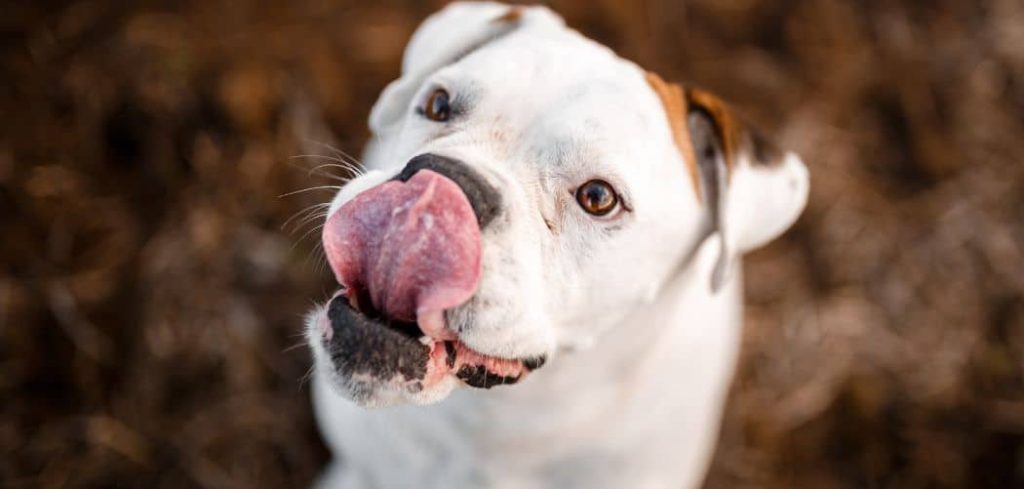Constant lip licking in an old dog can be a sign of discomfort, stress, or an underlying health problem.
While some licking is normal, persistent or compulsive licking may indicate dental issues or other medical concerns that require attention.
We outline the common reasons for constant lip licking in old dogs, what you can do at home, and when to seek veterinary help.
Old Dog Licking Lips Constantly: Why It Happens
When an old dog licks its lips constantly, it can be a sign of nausea, dental pain, dehydration, anxiety, or even a neurological issue. Sometimes it happens after eating or drinking, but frequent or excessive lip-licking usually points to an underlying problem.
If it continues, especially with other symptoms like drooling, vomiting, or loss of appetite, a veterinary checkup is needed to find and treat the cause.

Old Dog Licking Lips Constantly: Common Causes
Dental Disease
Dental problems are one of the most frequent causes of excessive lip licking in senior dogs.
Conditions such as gum disease, tooth decay, or abscesses can create pain and irritation in the mouth, leading your dog to lick their lips repeatedly.
You might notice bad breath, drooling, or difficulty eating. Dental disease is serious because untreated infections can spread to other organs, including the heart and kidneys, affecting your dog’s overall health.
Read more: Old Dog Licking Nose Excessively Suddenly (Here’s Why)
Nausea or Digestive Issues
An old dog may lick their lips constantly if they are experiencing nausea or gastrointestinal discomfort.
Conditions like gastritis, pancreatitis, or acid reflux can trigger this behavior. Signs may include vomiting, decreased appetite, and restlessness.
Persistent nausea is concerning because it can lead to dehydration, weight loss, and reduced quality of life if not addressed.
Pain or Discomfort
Chronic pain from arthritis, injury, or internal health issues may cause a dog to lick their lips repeatedly.
Licking can be a self-soothing behavior to cope with discomfort. Owners might observe other signs such as reluctance to move, limping, or tense body posture.
Identifying and managing pain is critical, as it affects both mobility and the dog’s overall well-being.
Anxiety or Stress
Behavioral causes such as anxiety or stress can also lead to compulsive lip licking in older dogs.
Changes in routine, environment, or the presence of new people or pets may trigger this behavior.
Accompanying signs can include pacing, whining, or excessive grooming. Left unaddressed, stress-related behaviors can escalate and impact your dog’s mental and physical health.
Oral or Throat Infections
Infections in the mouth, throat, or salivary glands can create irritation that prompts constant licking.
Signs may include redness, swelling, drooling, or difficulty swallowing. Infections are serious because they can progress rapidly, leading to more severe complications or spreading systemically if not treated promptly.
Medication Side Effects
Some medications may cause nausea, dry mouth, or oral irritation, leading to frequent lip licking.
Always review any new medications with your veterinarian and monitor your dog for changes in behavior or appetite.
Recognizing side effects early can prevent unnecessary discomfort and allow adjustments to treatment plans.
Old Dog Licking Lips Constantly: What to Do
Start by observing your dog’s daily routine, eating habits, and any additional behaviors that may indicate discomfort. Keeping a journal of symptoms can help your veterinarian pinpoint the cause.
Maintain regular dental care through brushing, dental chews, or professional cleanings as recommended by your vet. Healthy teeth and gums often reduce lip-licking behaviors.
Ensure your dog has a balanced diet suitable for senior dogs, as digestive upset or nutrient deficiencies can contribute to lip licking.
Reduce stress by maintaining consistent routines, providing familiar spaces, and using enrichment activities or interactive toys.
Monitor for signs of nausea, oral irritation, or pain and document changes. Early detection helps your vet address the problem before it escalates.
When to Call or Visit Your Vet
Seek veterinary attention immediately if your dog exhibits persistent lip licking combined with vomiting, loss of appetite, or sudden weight loss.
Dental emergencies such as broken teeth, abscesses, or severe gum disease require prompt professional care.
Observe for behavioral changes like lethargy, pacing, or signs of pain, as these can indicate underlying medical or neurological conditions.
Any swelling, redness, or discharge in the mouth or throat should prompt a vet visit to rule out infection or obstruction.
Early evaluation allows for proper diagnosis, treatment, and relief, preventing more serious health consequences.
Read more: Old Dog Losing Teeth (Here’s Why)
Key Takeaway
Constant lip licking in an old dog can arise from dental disease, nausea, pain, infections, stress, or medication side effects.
While some licking is normal, persistent or compulsive behavior warrants careful observation and veterinary evaluation.
Maintaining dental health, providing balanced nutrition, monitoring for signs of pain or illness, and reducing stress can significantly improve your dog’s comfort. Prompt intervention ensures your senior dog remains healthy, happy, and comfortable in their golden years.
